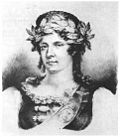Although doctoral degrees appeared in the universities of West Europe in the 12th and 13th centuries, for a long time they were given only to men. Below is a list of the women who obtained doctoral degrees before 1800. The list includes only academic degrees, not Doctors of Divinity.[ clarification needed ]
Constance Calenda (fl. 1415) may have received a medical degree from the University of Naples. [1] Juliana Morell "defended theses" in 1606 or 1607, although claims that she received a doctorate in canon law in 1608 have been discredited. [2] The putative 13th-century instance of Bettisia Gozzadini at the University of Bologna is discounted by Holt N. Parker. [3]
- Maria Pellegrina Amoretti, one of the first female doctors of laws
- Elena Cornaro Piscopia, the first female doctor of philosophy
- Dorothea Erxleben, one of the first female doctors of medicine


